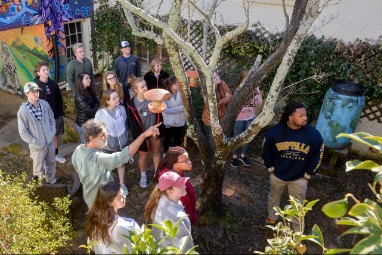SPARTANBURG, S.C. – Wofford College has received a grant of $250,000 from the Arthur Vining Davis Foundations designed to align faculty development and support with the learning needs of tomorrow’s college students.
The college will create a reciprocal mentoring program for faculty that enhances collaboration and leverages the faculty’s talent and expertise at all levels, and the grant will allow faculty and administration to work together to better address the challenges of the future in private higher education.
“Tomorrow’s college students are increasingly first-generation, socio-economically diverse and students of color,” Dr. Michael J. Sosulski, Wofford’s provost, says. “They often are driven by specific value propositions about college education and its pathway to career outcomes, and upon graduation, they will enter a rapidly changing economy with industries facing disruption on all sides.”
Dr. Stacey Hettes, associate provost for faculty development, adds, “To build on more than a century of success in educating tomorrow’s community and professional leaders, Wofford must create time and space for our faculty to dive deeply into discerning how best to prepare our students to navigate an unpredictable future that is evolving at an unprecedented pace.”
Wofford will use the three-year, $250,000 grant to create an innovative approach to faculty mentoring for pre-tenured, mid-career and advanced-career faculty as well as a comprehensive leadership development program for academic department chairs. “These programs will assist our faculty as they build a well-prepared, informed and energized team of campus academic leaders who will work through shared governance to meet the challenges the future of higher education brings,” Sosulski says. “They also align extremely well with the leadership development focus area of the Arthur Vining Davis Foundations’ Private Higher Education program.”
Sosulski notes that since he arrived at Wofford in 2016, he has been impressed by the faculty’s engagement and enthusiasm when seeking out professional development opportunities. “Throughout their careers, Wofford’s faculty make critical contributions to their students and to the institution. Tailoring development opportunities appropriately ensures that everyone is included in the process.
“A mentoring program based on reciprocity will allow faculty to learn from and collaborate with each other to solve problems and achieve goals,” he adds. “The hope is to go beyond the traditional top-down mentoring that sometimes falls short in meeting challenges faced by faculty members at certain career stages.”
The network of mentoring groups will provide the structure to help new faculty develop key competencies such as navigating academic advancement, developing a suite of original courses, sustaining a research program while getting a foothold in full-time teaching, developing professional networks and managing career challenges salient to women and faculty of color, Sosulski explains. “At the same time, it will assist mid- and advanced-career faculty who seek opportunities such as leadership development, redirecting scholarly interests or rethinking how their courses address changing student needs,” he adds.
The program also provides an opportunity to leverage previous faculty training in reflective practice through ePortfolios – a key element of a recently completed AVD grant Wofford received – for faculty development purposes at each career stage.
An important focus will be placed on providing learning opportunities – both on and off campus – for faculty department chairs. “Department chairs are critical to Wofford’s success because they represent the first major leadership step in the academy and because they directly foster our faculty members’ individual success and satisfaction,” Sosulski says. They will be provided opportunities for training, mutual support and continuing education in such topics as budgeting and financial management, communications and conflict resolution, pedagogical and curricular innovation, and the best practices in shared governance.
Wofford envisions creating a similar but customized experience for its department heads based on the program offered by the Great Lakes Colleges Association Academic Leadership and Innovation Institute, in which Sosulski participated when he was at Kalamazoo College. Once established, the program may be extended to collaborate with faculty development efforts at the other nine colleges in the Southern Conference academic exchange.
Wofford and the Arthur Vining Davis Foundations recognize that faculty development and leadership enhancement efforts must be evaluated against the value they add to the student experience, Sosulski says. “The needs of tomorrow’s student may not automatically align well with current practices and organization in higher education. We are excited for this opportunity to support today’s faculty leaders tasked with discovering and creating the most effective learning environments for Wofford’s next century,” he says. “As Wofford has grown, the organization structure has begun to expand by necessity, but significant opportunity remains for faculty to develop and refine their roles in academic leadership.
“We are grateful that with this major Arthur Vining Davis Foundations grant, Wofford faculty will be better prepared to meet the needs of our ever-changing student population,” he adds.
Wofford receives major grant for faculty development
$250,000 award from Arthur Vining Davis Foundations